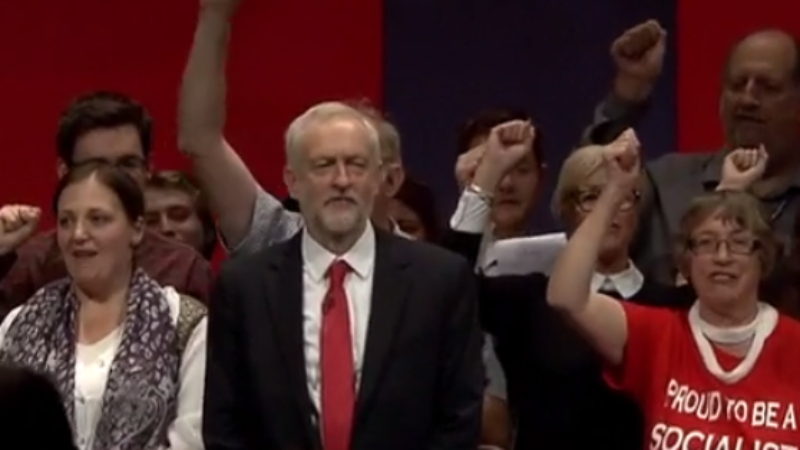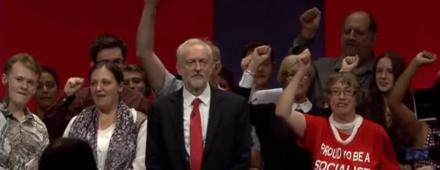

The ghost of Ed Miliband stalked the Labour conference hall today but Jeremy Corbyn is very much the future, whatever your view of him.
This Labour leader, elected again, emboldened once more, wanted to make it clear to allies and opponents alike that he is aiming for Downing Street. It was a riposte to the repeated demands from the party’s senior MPs to focus on power rather than protest.
So he crafted a speech that took on two of the biggest criticisms of his first 12 months of leader – that he didn’t have a plan for government and that he had been negligent in talking anti-semitism.
It was the last of these that he took on first. Just 24 hours after the Jewish Labour Movement had won backing for a rule change to toughen sanctions against bigots, Corbyn delivered a strong condemnation of prejudice.
“We know that robust debate has at times spilled over into abuse and hate around our party, including misogyny and anti-Semitism, especially on social media. That is utterly unacceptable,” the leader said.
“Let me be absolutely clear, anti-Semitism is an evil”.
This worked because we know Corbyn is opposed to abuse. It was stronger language today – now he has to deliver on it at every level of the party.
As Labour members we hope the shadow of anti-Semitism will quickly disappear into the past. We want a future in which we are competing for government and Corbyn has begun to sketch out how to get there.
We have an “electoral mountain to climb”, he said, especially if Theresa May abandons her habit of caution and goes to the country next year. It was a blunt statement but an honest one that can be agreed upon by supporters and critics alike.
But Britain needs a Labour government. Of course, they all say, but that doesn’t make it any less true. And Corbyn set out more of what his brand of “socialism in the 21st century” could deliver.
Some of it was familiar from the Milband era but not all. The right to a decent home, the introduction of a proper living wage and an end to zero-hours contracts were all features of an Ed M stump speech but Corbyn promised one reform that his predecessor rejected.
He committed Labour to lifting the borrowing cap on local authorities which would then allow them to raise capital against their housing stock to invest in building more council houses. It is a popular measure among the Labour faithful and one for which councillors had long lobbied shadow Cabinet ministers, without success – until now.
This proposal – as well as a pledge to deliver a National Education Service, funded by increasing taxes on business – were at the heart of Corbyn’s speech. Some will contest whether they are practical, or can be delivered, but they are substantial measures that begin to address claims that the leader hasn’t followed up on the policy-heavy platform on which he was first elected a year ago.
The doubt that nags at the back of the mind, however, is that pledges to borrow more and increase taxes may be met with a hostile reception by much of the media and inflame public doubts over Labour’s approach to the economy. It was not that long ago that David Cameron and George Osborne won a surprise majority after repeatedly intoning the phrase “more spending, more borrowing, more debt” in countless television studios. You can expect to hear a variation on that line when Tory conference takes place next week.
In Liverpool, Corbyn included some big attacks on the Tories. They were delivered with a precision that has sometimes been lacking from his rallying cries, not least when he addressed the aftermath of the vote to leave the EU by saying he wouldn’t write a “blank cheque to Theresa May and her three-legged team of fractious Brexiteers”. It was a good line that marked a speech which was both more coherent, and more confident, than last year’s version.
Corbyn is learning on the job and so are his MP colleagues. Backbenchers readily admitted this week that the issue of the leadership was now “settled” and the podium rang out with pleas for unity from shadow ministers, as well as Labour’s two next biggest elected figures in Sadiq Khan and Tom Watson.
There is much for Corbyn to build on from here. He has picked up the mantle of Ed Miliband in many areas but, however much Miliband is respected, he was not able to win support in sufficient numbers. We have long known why Corbyn is in politics. After today, we understand more about what he aspires to do in government. Now he has to overcome public scepticism and show he can get us there.




More from LabourList
Government announce SEND reform in schools white paper
SPONSORED: ‘Industrial hemp and the challenge of turning Labour’s priorities into practice’
‘A day is a long time in politics, so we need ‘action this day’’